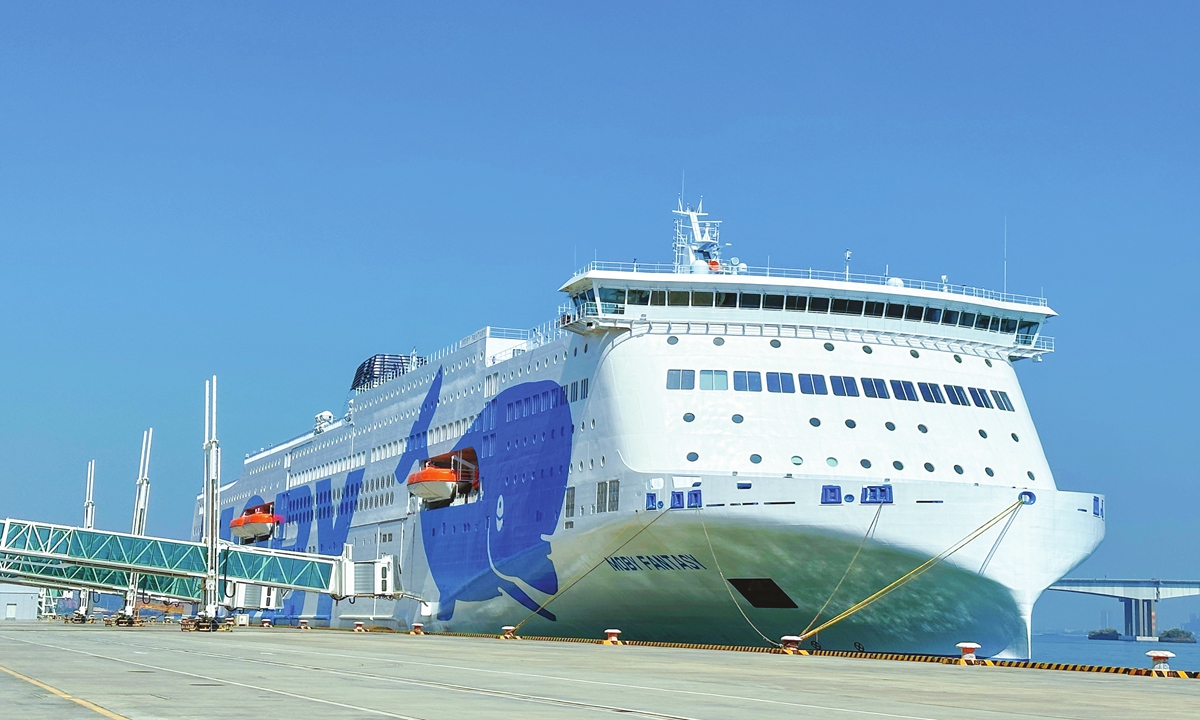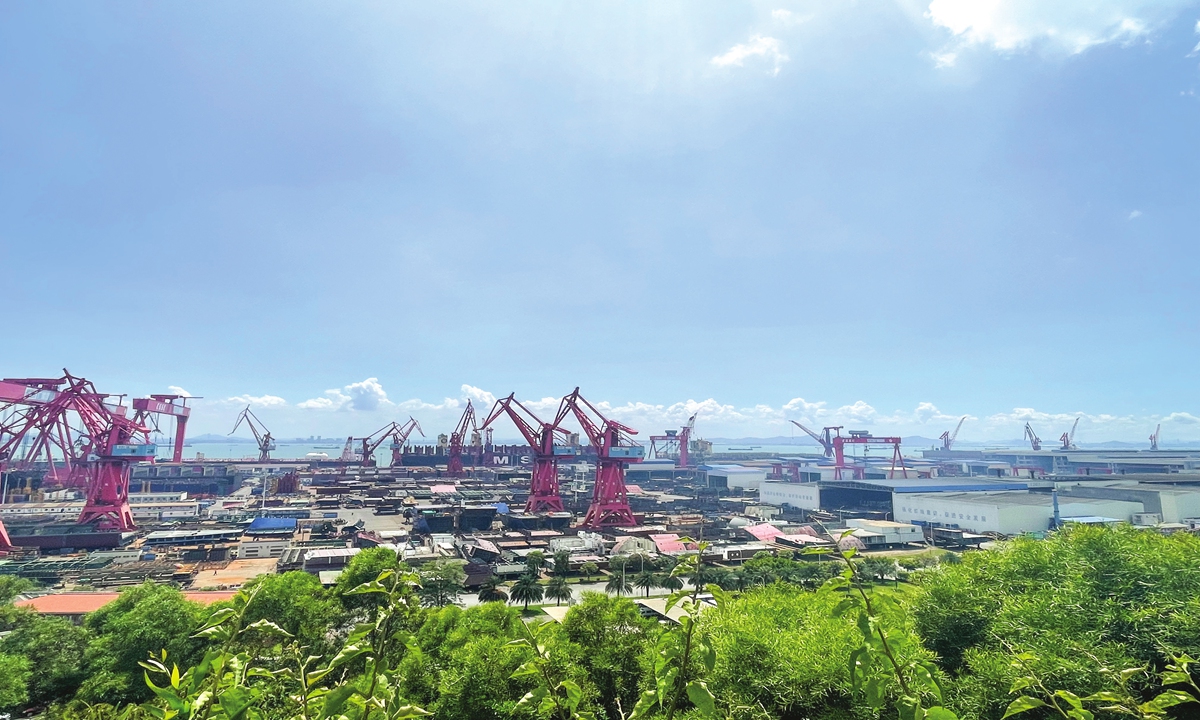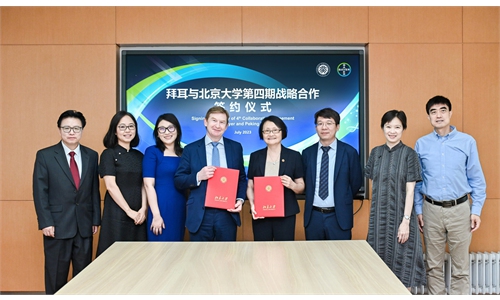China State Shipbuilding Corp becomes a front-runner in the world thanks to steadfast efforts
CSSC Guangzhou shipyard offers a microcosm of catching up from behind

The world's largest ro-ro passenger ship "MOBY" manufacutured by Guangzhou Shipyard International Co (GSI) Photo: Courtesy of GSI
Standing atop Longxue Mountain, overlooking the sprawling 3.02 million square-meters Guangzhou Shipyard International Co (GSI) in Nansha, South China's Guangdong Province, the dry docks and piers present a bustling landscape.
"Our shipbuilding orders have been piling up until 2026," Zhou Xuhui, vice president of GSI, told the Global Times on Wednesday.
The company, a major subsidiary of China State Shipbuilding Corp (CSSC), the nation's top shipbuilder, is the largest of its kind in South China.
The bustling scene at GSI also serves as a microcosm of the shipbuilding boom, a sector which has witnessed a double-digit increase in output value, and a record number of new ship orders in the first half of the year, retaining its top ranking in the world.
Data from the Ministry of Industry and Information Technology showed that China's shipbuilding output hit 21.13 million deadweight tons (dwt) in the period, increasing 14.2 percent year-on-year and accounting for 49.6 percent of the global volume.
New orders, another major indicator of industry growth, rose 67.7 percent year-on-year to reach 37.67 million dwt, accounting for a global market share of 72.6 percent.
China is the only country that has achieved overall growth in the three major indicators, with many saying it reflects Chinese shipbuilding industry achieving a "benign development trend," said Li Yanqing, secretary-general of the China Shipbuilding Industry Association.
Manufacturing prowess
To take a closer look at China's shipbuilding prowess, the Global Times has paid a visit to the shipyards in Guangzhou, one of the country's manufacturing hubs, last week, visited factories, toured China-made ships, and spoke with industry players to piece together how the domestic industry has overcome entrenched advantages once held by Japan and South Korea in the past decade.
A close observation of the home-made ro-ro passenger ship "MOBY" was truly eye-opening. The Global Times toured the yet-to-be delivered ship on Wednesday, visiting restaurants and entertainment venues of approximately 10,000 square meters, with delicate decorations that offer a luxurious experience similar to a "floating five-star hotel on the sea."
This ship was ordered by an Italian client, the second of its type produced by GSI . The first one has already been delivered and entered operations along the Mediterranean coast, connecting Italian ports such as Genoa, Olbia, and Livorno.
Cao Jifei, a project manager of the ship, told the Global Times on Wednesday that there are currently six similar luxury cruise ships under construction, expected to be delivered in 2023, 2024, and 2025, respectively.
"After operating for a period of time, our foreign customers said this ship has faster speeds, increased passenger capacity, and significantly reduced fuel consumption," Cao said.
According to Cao, there is a high demand for luxury cruise ships in European countries, with approximately 200 passenger ships already over 20 years old and a continuous demand for upgrades. "China occupies 70 percent to 80 percent of this market share. Factors such as competitive pricing, faster construction periods, and excellent performance have contributed to China's rapid growth in this field," Cao said.
Apart from ro-ro passenger ships, the company is capable of designing a wide range of vessels in compliance with the major international standards, and has secured many firsts in both China and globally.
"We have delivered the larger number of luxury cruise ships, have the highest number of orders for ro-ro passenger ship in the world, secured the highest number of orders for automobile transport ships globally, held the distinction of delivering the most icebreakers and ice zone transportation vessels in China, and have emerged as the foremost provider of MR and LR oil tankers in China," Zhou said.
Being the front runners does not mean China has "secured the top place," Zhou said, predicting that the competition between China and South Korea could be fierce over the next 15-20 years.

A view of the Guangzhou Shipyard International Co in Nansha, South China's Guangdong Province on July 12, 2023 Photo: Shen Weiduo/GT
Localized supplies
Standing up a complex and high value industry like shipbuilding does not happen overnight. It requires years of investment in technological advances and sustained effort across generations.
"Since 2017, we have been implementing 100 percent localization of interior outfitting for ro-ro passenger ship, which has allowed us to exert significant control over production schedules and substantially reduce interior outfitting costs," Cao told the Global Times.
Domestically developed materials were not "trusted" at first, but have turned out to be highly popular, Cao said, noting that with an increasing level self-reliance and other capabilities, domestic shipyards now have gained more control over material choices, colors, and designs. "This control has in turn promoted the development of the whole localized supply chain."
Shipbuilding cycles have also been significantly reduced after the localization efforts, with construction periods at port reduced from more than 20 months to approximately 6 months, said the company.
Over the past decades, other breakthroughs the company has made including developing groundbreaking ships such as the world's first polar heavy-duty deck transport ship and LNG dual-fuel luxury cruise ships. These achievements have filled technological gaps, establishing GSI as a global leader in shipbuilding.
That momentum also goes along with the rise of China's shipbuilding manufacturing power.
In 2008, the launch of China's first self-built LNG carrier the Dapeng Sun broke South Korea's monopoly on LNG ships, and in 2023, China's first large domestic cruise ship Adora Magic City broke Europe's monopoly on making luxury mega-cruisers.
In response to global political uncertainties that impact industry development, Zhou said challenges will remain, and while the company is pursuing more international cooperation, it has run into instances of protectionism.
"We will not close the door, as the closed-door development is never an option for us, no matter how things will evolve," Zhou said, adding he has "full confidence" in the development of the domestic shipbuilding industry.




